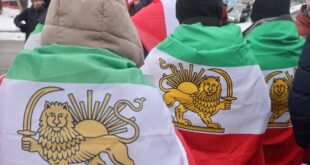BRUSSELS (AP) — The European Union hopes for a substantive response from Iranian nuclear negotiators on Tuesday regarding a package of incentives offered to Tehran as a way of ending the standoff caused by its nuclear programme, an official said.
“We want to hear the response of the Iranians,†EU spokeswoman Cristina Gallach said Monday, referring to Tuesday’s meeting between EU foreign policy chief Javier Solana and top Iranian nuclear negotiator Ali Larijani.
Solana is hoping for a positive reply from Larijani that he could present Wednesday in Paris at a conference of the foreign ministers of Britain, France, Germany, Russia, the United States and China.
The countries want an Iranian response to the incentives package before the July 15-17 summit of the Group of Eight (G-8) wealthiest industrialised nations in St. Petersburg, Russia.
Last week, Larijani met with Solana for a private dinner after unexpectedly skipping formal talks supposed to have been held in Brussels a day earlier. EU officials described the dinner as “a good start.†US officials said, however, that Larijani had failed to come up with a long-awaited answer to the offer of nuclear expertise and reactors in exchange for a pledge by Iran to suspend uranium enrichment activities. He had also not committed his country to suspending uranium enrichment and starting negotiations on the six-power package, they said.
Iranian government officials have insisted they need to clear up “ambiguities†contained in the package, and have brushed aside US demands that they respond before the Paris meeting.
On Sunday, Iranian Foreign Minister Manouchehr Mottaki warned the G-8 summit against making any decisions on Iran’s nuclear programme without consulting it first, arguing that this could harm Tehran’s talks with the EU. Mottaki reiterated that Iran would give a formal response to the offer by the five permanent members of the UN Security Council plus Germany in August.
EU officials have said Larijani would likely seek explanations of some aspects of the offer, and possibly submit a counterproposal of his own at Tuesday’s talks.
Western officials have threatened to restart efforts to punish Iran through possible Security Council sanctions unless Tehran stops enrichment and agrees to talks by Wednesday.
Tehran has asserted repeatedly that its nuclear programme, which includes uranium enrichment, is peaceful and aimed at generating power. But the process is contentious because enrichment can both generate power or create the fissile core of nuclear warheads, and the US, Israel and EU all fear the research programme is a cover for developing nuclear weapons.
Meanwhile, an exiled Iranian opposition group announced its members will demonstrate against the Iranian government in front of the EU offices in Brussels where both delegations will be holding talks.
In Israel, Prime Minister Ehud Olmert urged the world to block Tehran’s efforts to enrich uranium. He claimed Iran was a threat because of what he described as the country’s zeal in trying to obtain nuclear weapons and the anti-Semitism of its leaders.
Separately, Italian Foreign Minister Massimo D’Alema issued a strong appeal to Larijani for Iran to agree to negotiate on the basis of the package presented by Solana in Tehran last month, the foreign ministry said after the two men held talks.
Earlier in the day, Italian Premier Romano Prodi met with Larijani in Rome. Italy, which has major energy interests in Iran, wants to be part of the negotiations.
Prodi said that a deadline needs to be set for resolving the issue, according to an interview published in Russian daily Izvestia.
 Eurasia Press & News
Eurasia Press & News



